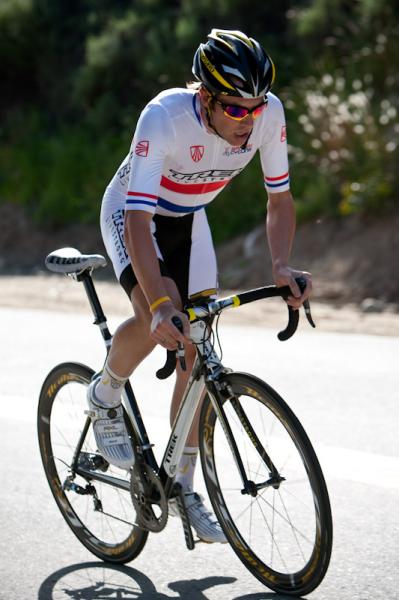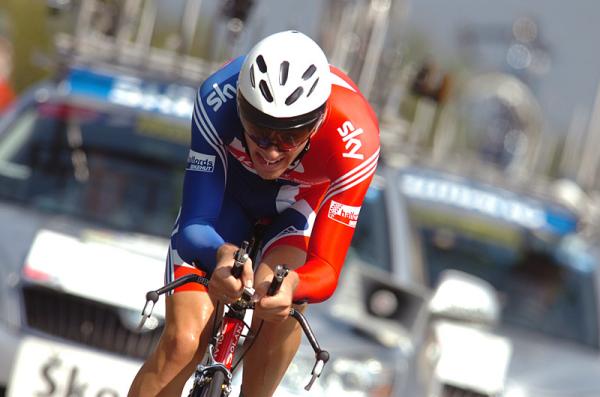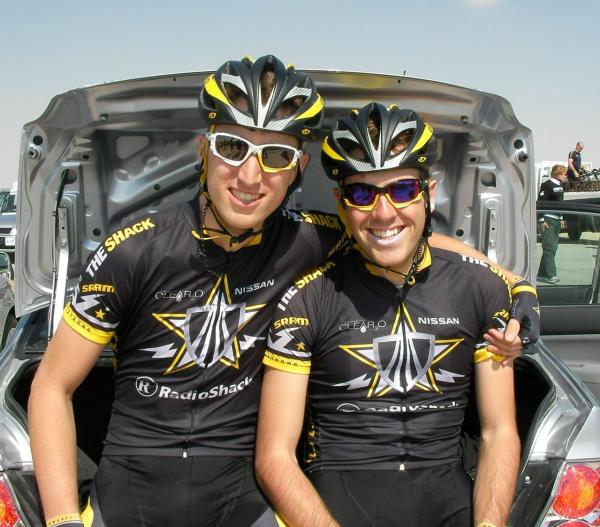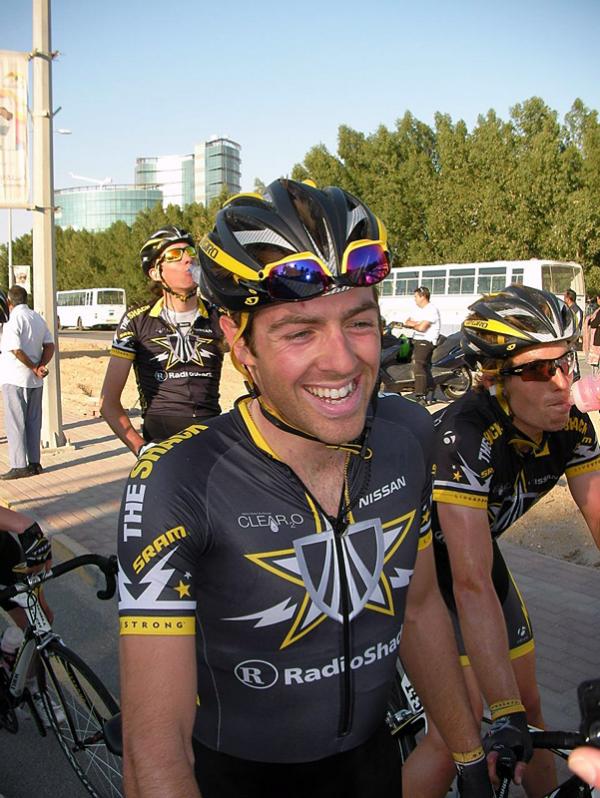Dowsett delivers for Trek-Livestrong
Briton holds own against ProTour competition, raises awareness of haemophilia




British rider Alex Dowsett joined the Trek-Livestrong team for the 2010 season following his impressive seventh place in the U23 time trial at the 2009 world championships. The 21-year-old spoke to Procycling's Ellis Bacon about living with haemophilia, almost chastising Lance Armstrong and Pippo Pozzato being nice to him.
Cyclingnews: You started your season with the tours of Qatar and Oman, riding against some of the best riders in the world, and yet you managed to hold your own.
Alex Dowsett: Yeah - with just a day in between the two races, it's been the longest stint of racing I've ever done, and easily the highest standard of races I've ever done. I went to both races hoping just to be able to get through them, to be honest, but then the fact that I was able to actually feature in them has been really good.
In Qatar, I was in a break for 25km on the third stage before they brought us back. I think they were a bit scared, as the race-winning break had gone the day before. And then in Oman I was in the day-long break on the second day, which was really hard. I managed to pick up some time bonuses along the way, which bumped me up the overall classification, but then I was so tired that I lost it all the next day.
CN: And then you were in that front split in Oman that left race-leader Edvald Boasson Hagen behind, after he'd stopped to answer the call of nature...
AD: That was just massive for me, with all the top guys in there. It was crazy - I'd be sitting on Tyler Farrar's wheel, then Daniele Bennati's, then Tom Boonen's. There was no one up there who wasn't good. I think I had a grin on my face for most of those 40 kilometres.
But I'm not going to lie - I was just in the right place at the right time, but I got myself 12th on the stage, which was nice. Not so nice for Boasson Hagen, of course. I don't know what really happened there. Our little team didn't get told much afterwards, but I think it was six of one and half a dozen of the other.
Get The Leadout Newsletter
The latest race content, interviews, features, reviews and expert buying guides, direct to your inbox!
He did stop for a piss, but he stopped inside 50km to go on a 190km stage, just when it was about to get going. But I'm going to have to sit on the fence on that one, I think.
CN: Trek-Livestrong was the youngest and most inexperienced team there in the Middle East. How did the other riders treat you?
AD: It's funny - I found that the bigger and better the teams and the riders were, the nicer they were. The smaller teams were the ones who were a bit more aggressive. Maybe they saw us as more of a threat to them. Filippo Pozzato and Tom Boonen, in particular, took a lot of time to talk to us. And Bernhard Eisel pointed out things to me a couple of times that I was doing wrong, and explained why, too, which was really good.
One day in Qatar, my timing transponder had twisted up on my chainstay so that my foot was kicking it with each pedal stroke. Pozzato came up and told me to stop pedalling, and started pushing me while trying to kick the transponder back round, so he had his foot, like, centimetres from my rear wheel. I was, like, "No, no - just leave it - I'll stop and fix it myself." He didn't need to do that, but it was massive for me. Probably not so much for him, I'm sure!
CN: So you feel like you learned a lot, then, and justified the team's inclusion in those races.
AD: Definitely. Obviously our team manager, Axel Merckx, is Eddy Merckx's son, who helps organise both races. But we went there, and we raced - we weren't there just to ride around. We tried to take it on when we could. I tried to get involved in the sprints in Qatar, too, to help Taylor Phinney.
Against those other big teams, though, there wasn't a lot we could always do, and we had to let Taylor bounce around and do the business on his own, which he did! I feel like I learned a hell of lot, though. In those sprints, I'd poke my nose in, get pushed around, and think, "No..." But although it's hectic, it still feels really safe with those guys. You just have to be on your toes.
I was probably a lot more forgiving than I am when I'm racing against riders more on my level. The last thing I wanted to do was wipe out Fabian Cancellara or something. But we knew that we were lucky to be there. We got involved, we got in the breaks... It was a really good experience for the team.
CN: Before your seventh place in the U23 time trial at the Worlds, you were all set to join the Rapha Condor Sharp team for 2010, weren't you?
AD: Last year I didn't have such a good season up until the Worlds. But Rapha manager John Herety offered me a really good ride ahead of the Worlds, but said if a better offer came along - a Pro Continental or a ProTour team - then he'd quite happy to let me go for that, as he's all for trying to move riders on.
Trek-Livestrong was interested after the Worlds, but they're only Continental, so I was worried what John would say. But he said, "Yeah - that's a step up. Go for it." They supported me when I wasn't going so well, and then let me go when an even better offer came along, so I'm very grateful to John and the team for that.
CN: So what's it like being part of a team that was founded by Lance Armstrong?
AD: They're a really good bunch of lads. We all got together at the same Tucson training camp as RadioShack. There were a heck of a lot of good riders there - Gert Steegmans, Levi Leipheimer... And then Armstrong popped in one day when we were eating dinner and took us by surprise. It was the first time I've ever been really star-struck, I think. And then we all rode together on the last day of the camp.
At one point, someone was hanging on to my seat post. I thought it was just one of the boys, so turned around to give them some abuse for picking on the Brit, and it was Armstrong!
CN: Do your mates back in the UK realise what a big deal it is?
AD: People at home know the big names like Chris Hoy and Bradley Wiggins, and most people have heard of Armstrong. But I was talking to this one girl the other day, and told her I rode for Armstrong's team, and she asked if he was the first man to walk on the moon. Not quite...[laughs]
CN: You have haemophilia, and do what you can for the Haemophilia Society to try to make people more aware of the disease.
AD: Yeah - I do what I can. I do a blog, but would like to do more in the future. It's quite an expensive disease to treat, so any money they can get is massively beneficial.
CN: Do you feel like you have some kind of a responsibility, being in the privileged position you're in?
AD: If it wasn't for the Haemophilia Society, I wouldn't be here. I owe them a lot - and the National Health Service. It's quite a fickle kind of a disease. If it wasn't for the way my parents handled it, I could be in a lot worse position. I've got it as bad as you can possibly have it, but I know lads who don't have it anywhere near as bad as me, yet they've got fused joints and stuff, and that's very life-changing.
I'd say I'm as healthy as anyone else, I think. But it's about bringing awareness to that - about how best to cope with it. My parents took a proactive role when I was young, and asked the doctors what they could do. They said they should get me swimming, so they had me swimming five times a week, in five different towns. It's good for the joints, and keeps you fit. It's stuff like that that benefits you long-term.
It's not just about the medication - it's about how you grow up, and how you treat it outside of the medication. As a kid, I had to go into school often on crutches or with my arm in a sling, but it's hard to explain to other eight-year-old kids why your arm is in sling but you don't have a cast. They think that you're faking it. But you can't explain to them that you're missing the clotting factor so you get internal bleeding.
But in a roundabout way, I don't think I'd be cycling if it wasn't for the haemophilia, as all the swimming made me fit. I joined a proper swimming club, then hopped on the bike and went from there pretty rapidly.
CN: But surely there's a lot of danger when you're cycling - mainly in terms of crashing.
AD: I try not to think about it and, touch wood, have never had a crash bad enough where I have had to think about it. If I break a bone, it's more serious than for someone without haemophilia, but most bike crashes result in just losing a bit of skin, which isn't such a problem.
I played a limited amount of football (soccer) when I was a kid, and didn't touch rugby, or many other contact sports, but I didn't really mind as I was useless at them anyway. I used to go to the doctor's for check-ups every six months, and one day I told them that I'd taken up cycling. They said they'd rather that I'd taken up playing chess or playing a musical instrument, but that they weren't going to stop me. So I suppose I will just cross any bridges when I come to them.
CN: It seems that within sport - and within cycling, such as Team Type 1 helping in the fight against diabetes - more and more individuals and teams are proving that you can still succeed in the face of various diseases.
AD: Yeah - definitely. It's like with Taylor's dad, Davis, who has Parkinson's. I think almost everyone likes sport in one shape or form, and it's about showing that you can often live a normal, active life, and take part as best you can. I've had to sacrifice some stuff, but it hasn't stopped me.
I have to inject Factor 8 - that's what's missing from my blood. And it's interesting as a bike rider having to do that - the whole stigma. It's a difficult one - I still don't know whether to hide the fact that I'm having to give myself intravenous injections every other day for fear of someone saying that they've seen me injecting myself and thinking I'm on something. I've got needle marks on my arms, and I'm sure they get noticed, but I've got nothing to hide. I just hope that as I hopefully progress, people will become more aware of it, like with Armstrong's cancer. OK - at least I hope I can get to his level one day! [laughs]
CN: You live in Boulder, Colorado, with Trek-Livestrong's other foreign riders. How's that, and is your race programme going to be mainly US-based?
AD: I've had a bit of a shaky start, as I've lived at sea level all my life, and Boulder is at five-and-a-half thousand feet! Soon after I got there, I went for a ride up in the hills and got very ill. I'm not one to make any excuses, but my preparation for this season has been nothing short of terrible. It was a bad winter in England, and then at our training camp in California they had the worst storms in five years, so we were on the turbo trainers all week. And then in Boulder I had to take it easy because of the altitude.
I moved there in mid-January, but I've got a long stint there now, so I should be OK and will hopefully get some good training done before San Dimas and Redlands. Then we have the Tour of the Gila and Joe Martin stage races, then the Olympia Tour in Holland, the U23 Paris-Roubaix in France, the Baby Giro in Italy, and then I've got the European TT champs.
CN: You've come up through the British Cycling ranks, starting with the Maldon and Glendene clubs and then progressing through BC's Talent Team, the Olympic Development Programme and the Olympic Academy. Wouldn't joining the new Sky team have been the next logical step?
AD: After the worlds I spoke to [Sky coach] Rod Ellingworth, and asked what the chances were, and he said they'd gone from zero to slim. He's great - he's brutally honest, like British Cycling is. But I think it would have been a bit early to have joined Sky this year. Don't get me wrong - I would have jumped at the chance if they'd offered it to me, but I would have been a bit worried.
It's my last year as an U23, and hopefully I now know what I need to do to make that step up. And hopefully I showed myself enough at Qatar and Oman to be on a few teams' radars.
CN: Did any other teams approach you after the Worlds?
AD: [Cervélo TestTeam's] Dan Lloyd has helped me out a hell of a lot. There were a couple of options after the worlds, and Dan had helped set up one of them. As I say, I think it would have been a bit too early this year, but I want to make that step up next season, and I wouldn't really be that fussy which team, if I'm honest.
But certainly joining a team like Cervélo, HTC, Sky, Quick Step or Saxo Bank would be amazing. They're all just so well drilled. I think I've just picked all the biggest teams there! But I think I would prefer a more English-speaking type of team. I've heard stories of some teams where if you're a foreign rider it's quite difficult, but a team with a real mix of nationalities, like Saxo Bank or HTC, would be great. I have three goals for this year: to turn pro, to win the European time-trial championships and to win the U23 TT worlds.
CN: How likely is that U23 Worlds title after your seventh place there last year, do you think?
AD: All of the guys that beat me last year have now moved on. Actually, I'm not sure about the German, Marcel Kittel, who was fourth. But Jack Bobridge has moved to Garmin, Nelson Oliveira has gone to Xacobeo, Patrick Gretsch is with HTC-Columbia and Adriano Malori and Alfredo Balloni have both gone to Lampre.
I would love to be world champion, and I think it's possible this year. OK, so as it's my last year as an U23, I wouldn't be able to wear the rainbow jersey next season, but to say I was world champion would be enough. Before that, I've got the Euro TT champs and the national TT champs, too. I've won that twice, including last year, but British Cycling didn't make me a national champ's skinsuit last season.
They made Peter Kennaugh a jersey for winning the U23 road race, but we were based in Italy, and they don't do much time trialling there, so that was the reason. But Trek has made me one for this year now, so that's pretty cool. Wearing any national or world champs kit is great, but it's that worlds title that I'm really after.